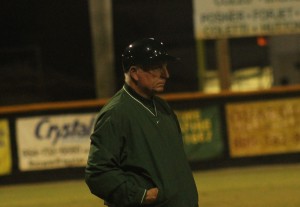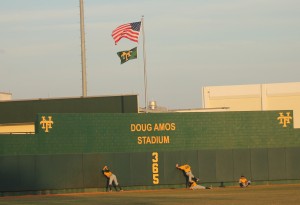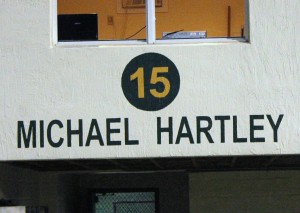Sunday Morning Chat: Nova Manager Pat McQuaid
 OK Broward fans, we are honored to be sitting down today with legendary Nova Manager Pat McQuaid. Coach McQuaid has been running the program at Nova for 42 years, and he is a staple not only for Nova baseball but also for baseball across Broward County and the entire state of Florida. In his years of coaching he has helped to establish the Nova baseball program into one recognized for its success, traditions and its class. Now he takes a moment to chat with HSBN senior correspondent Rick Duteau for a very special Sunday Morning Chat. Enjoy!
OK Broward fans, we are honored to be sitting down today with legendary Nova Manager Pat McQuaid. Coach McQuaid has been running the program at Nova for 42 years, and he is a staple not only for Nova baseball but also for baseball across Broward County and the entire state of Florida. In his years of coaching he has helped to establish the Nova baseball program into one recognized for its success, traditions and its class. Now he takes a moment to chat with HSBN senior correspondent Rick Duteau for a very special Sunday Morning Chat. Enjoy!
Rick: Coach, with over 800 wins, state appearances and titles, and dozens of professional players that you have coached, let’s start off with the obvious question… How much longer you want to keep doing what you are doing?
Coach McQuaid: As long as I still enjoy practice. Who knows? We’re just going year by year right now. It’s still enjoyable, and I always said that when I don’t enjoy practice then that is time to get out. But it might be a year, it might be two years. I just go day by day. I think everything is in good shape here as far as the facility and the assistant coaches that when I do retire I think everything will be fine.
Rick: Is it something you have put a lot of thought into? It sounds like you don’t have it on the mind very much.
Coach McQuaid: You always do, but when that day comes you will know it. I don’t want to stay too long, but in the same vein I still enjoy the kids and I still enjoy the competitiveness of baseball. I enjoy putting the puzzle together and trying to put the best product out there, and I just enjoy helping kids. So today it is fine. But who knows? Maybe tomorrow I will wake up and say it is time. I think I’ll know that. But it’s hard to give something up that you have put 42 years into doing. I don’t know what I would do if I wasn’t coaching baseball. But that day is going to come, and who knows when that is going to be?
Rick: You’ve seen a lot of players and coaches come through Broward over the past few decades. Give us your opinion of how the players have changed over the years, and also, how the coaches have changed…
Coach McQuaid: That’s a tough one… The kids have certainly changed. When I started coaching kids played baseball all the time; you know, sandlot baseball. They practiced all the time. Now the kids will do what you want them to do, but sometimes they don’t practice on their own. I think that’s one big change. I think because of so much parental involvement they seem to have a little bit of entitlement, and sometimes I think moms and dads don’t let the kids fail. Kids have to fail to be successful. When I started coaching you always challenge the kids to be great. Now if you tell a kid he is not very good he will believe it instead of wanting to prove to you that he is good. So I think that is the thing that has changed. As a whole the kids are not as competitive, as far as wanting to be great, as they were in the past. Everything is too structured, too organized and everybody gets an award for being on a team. No, you have to fail, you have to work hard and you have to want to be great. You have to put the work in, and I think that has changed a little bit. I know when we have our kids at practice they will work as hard as anybody, but when the batting cage is open all day Saturday you don’t seem them in there hitting and doing the extra stuff as much as kids had done in the past. Because of whatever, social media and video games or whatever, the kids aren’t out there playing like they did in 1972 when I started.
Rick: Does that affect things from the coach’s end? Are there changes you have seen from the coaching point of view?
Coach McQuaid: No, not really, because the kids are going to work if you make them. That hasn’t changed in the kids. If you ask a kid to do something, at least here at Nova, they respect me and my coaches enough that they are going to do what we ask them to do. That is not an issue. Kids are just different, and I think the parents give them too much. Some of them are entitled, and like I said before, they are not allowed to fail. When I started coaching parents would drop a kid off as a freshman and pick him as a senior. Now they are there all the time. Which isn’t a bad thing; it’s just different. 
Rick: Let’s talk specifically now about your coaching style. How much, and in what ways, has your coaching style changed through the years?
Coach McQuaid: Oh, I think I’m stubborn. I don’t think I’ve changed a lot, mainly because I don’t want to and I don’t think that maybe I need to. I’ll challenge the kids and I’ll be tough on them in practice. I don’t think that’s changed because I think that’s the way you have to do. If you don’t expect a kid to be great then he’s not going to be great. If you didn’t expect them to do the right thing all the time then they are not going to do the right thing, because kids are kids. So in that aspect I don’t think I’ve changed a whole lot. I’m still old-school and maybe grumpy sometimes too much. But I want the kids to respect the game of baseball and play the game right. That’s what you need to do.
Rick: As with any program, stability and continuity among the coaching staff is always a key to success. You’ve had some guys that have been with you a long time on your staff, how important is that to you?
Coach McQuaid: That’s the number one thing. When I started coaching I did it all by myself, and then for a bunch of years it was me and an assistant. But as the years have changed, and with JV baseball, you know all our kids are working together. I have had great assistants, and probably in the last twenty years, you have coaching staffs now. I think that is the same across the county. You might not be able to pay them all, but really we need five guys to conduct the practice that we do with putting all the kids together in practice. It’s important that your coaches are loyal. It’s important that they have the same vision that you have, and that they believe in the things that you try to instill in the kids.
I have a good staff. Brian Lubekert has been with me since 1998. Coach Simone, who was the head coach at Miami-Dade North and then for years with Coach Paul Mainieri at Miami-Dade North, he’s been with me for the last six years and his son played for me in 1992. He is like our Bench Coach and he works with the catchers and pitchers, and it’s good to have another person around you that has been in baseball his whole life. Kyle Tabora has been with me the last five years, and he played for me and graduated in ’03. Bart Graf, who is not coaching this year but he was with me for about eight years when his kids played in the program. He was the head coach at Plantation High School for years.
We just have had a lot of guys come through that have played for us and coached, and you need the guys to do that. You’ve got to have those people, because you can’t do it yourself anymore. Steve Alfonso is on our staff this year, and he was at Archbishop McCarthy for years. He is over helping us now. You know, I can’t do the things I used to do; I can’t hit the fungoes the way I used to and I can’t throw BP anymore. So, you need those people to do those things. You are only as good as your assistant coaches, and I think everybody will tell you that throughout the county. You are only as good as the people who help you.
Rick: In a way too, it makes it a little bit easier for you because now you’ve got them running the different things and you can kind of oversee the entire puzzle.
Coach McQuaid: Yeah, but I miss throwing BP. I can still hit some fungos, but not as good as I used to. I think that is the biggest disappointment as you get older. You can coach football to an old age because you don’t have to get out and be physical. But baseball is a sport that you have to hit fungos, you gotta throw BP and you gotta be in the cages doing stuff. I’m finding as I get older I can’t do the things I used to do, which is a big disappointment. So age is coming into it. I’m still physically fit, but I can’t do the things that I did. I can’t throw 400 pitches in BP like I used to, and I have to depend on the other people to do those kind of things. Yes, I need good coaches, and they have really helped to keep the program stable and put our system in. They believe in what we are doing and it has been successful. 
Rick: Speaking also about tradition, I know one of the things you added to the field last year was the name to honor Doug Amos. Coming in today I noticed something new with Michael Hartley’s number painted up over the home dugout. Talk about guys like that and being able to have the facility to honor all of the Titans over the years.
Coach McQuaid: A long time ago when I started coaching, one of my principals Ted Boyack, and that was when I was the head football and the head baseball coach at the same time, and he was my football coach in high school, he said, ‘If you are going to stay some place for a log time, why don’t you try and do something special? Why don’t you build a facility, and I’ll let you do it’. That made a lot of sense, because before you played the games and the field was what it was. I think at that point the whole thing started, and it snowballed into something that is enormous. Our first construction was in 1990 when we started the baseball locker room. A gentleman by the name of Bruce Bernard, whose son played for me and ended up going to Air Force and Wake Forest, he was an engineer for the town of Davie and he came out and sort of helped us get started. Then a couple dads like Sal Hauser and Mr. Drohan and Mr. Nash convinced me that they had the money an the resources to build a locker room. Mr. Bernard introduced me to Doug Amos, and he was the contractor. For about $30,000 dollars we put in a thousand feet of sewer, 800 feet of water pipe and built the locker room with concessions and bathrooms. That was sort of the thing that started everything taking off.
The kids worked Joe Robbie Stadium concessions, and with the donations and the money the kids raised we built the locker room in 1991. Then in 1995 we built the batting cages, and that cost us about $50,000 dollars to build, but probably had about $150,000 dollars in donations. You look at that and that place is beautiful. But again, Mr. Bernard and Mr. Amos took that upon themselves and got donations, and with the help of him and Mr. Hartley and a lot of other parents we got that built in 1996. Then in 2002, when we were doing construction on the football stadium, and Mr. Amos was in charge of that because the town of Davie put the football stadium up. He was like, ‘Why don’t we piggyback the stadium and use some of the fill and elevate our bleachers and put in a new backstop and build a press box in one of the dugouts?’ So without any real cost to us, except for maybe $15,000 dollars, we got all the donations for that, and that was at least another couple hundred thousand dollars because we elevated everything and put the wall behind home plate, and the press box and the dugout.
Then, after Hurricane Wilma where we had some things destroyed, we were able to piggyback on some donations and redo the visitor’s dugout. So, it was just through a dream and the dream sort of came through. The last thing we had done was the outfield wall, which was something we always wanted to do because we had a chain-link fence and then the wind would come and blow the wind screen off. We always had issues with that. So another player of mine, Brett Atkinson, and Moss Construction, they helped organizing everything. What we have now is probably about $150,000 and we raised about $50,000 for it, so we had a lot of donations because it is padded and it’s really special. Now the last thing before I retire is we want to be able to finish it, because we still have a little bit in left field and right field to finish.
But it is truly a stadium. We can seat a thousand people with the elevated bleachers, and nobody else in South Florida has the facility that we have that has been built by our own people and not funded by Broward County Schools, and not just given a gift. It has been the hard work of a lot of parents, and the kids have always had to buy in and raise money for anything that we add. It is not just given to them. So it is something that through the years has gotten bigger and bigger, and now it is just a monster to maintain. Hopefully when I do retire, the place stays the same and somebody can maintain, because it costs at least $15,000 dollars a year just to maintain the batting cages or whatever it needs. The turf in the batting cages lasted about 20 years, so now we need to re-turf that, and we have to redo the halo behind home plate. Every year there are expenses that have to be addressed that you’re just not going to get from the school board. It is from a lot of ex-players and people in the community that have really come to make our facility what it is.
The field was named after me ten or fifteen years ago, and you know not with anything that I had anything to do with. It was a surprise and it was pretty nice. But Doug Amos was a big part of our facility and his hands were on anything that was built out here. He passed away of cancer, and we renamed the stadium after him, which was something we needed to do. He was a special man. Michael Hartley, we have a dedication to Michael on our dugout and our memorial wall, and he is a young man that passed away in August. He played for us on two state championship teams, and he played at Nova Southeastern. He passed away at age 25 this summer, so I think it was important because Michael was a big part of our success and he was a great person. The Hartley family has really been a special family at Nova, and we needed to honor his memorial…
*Part II coming next week!








